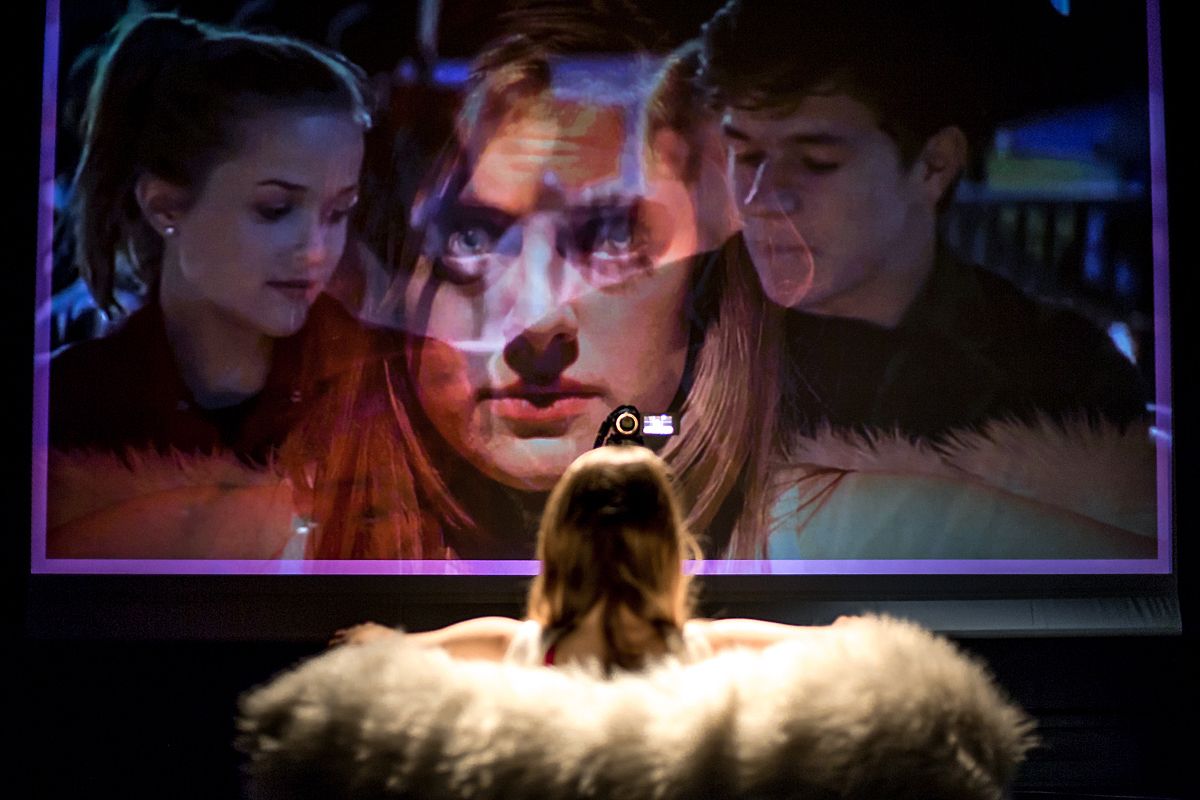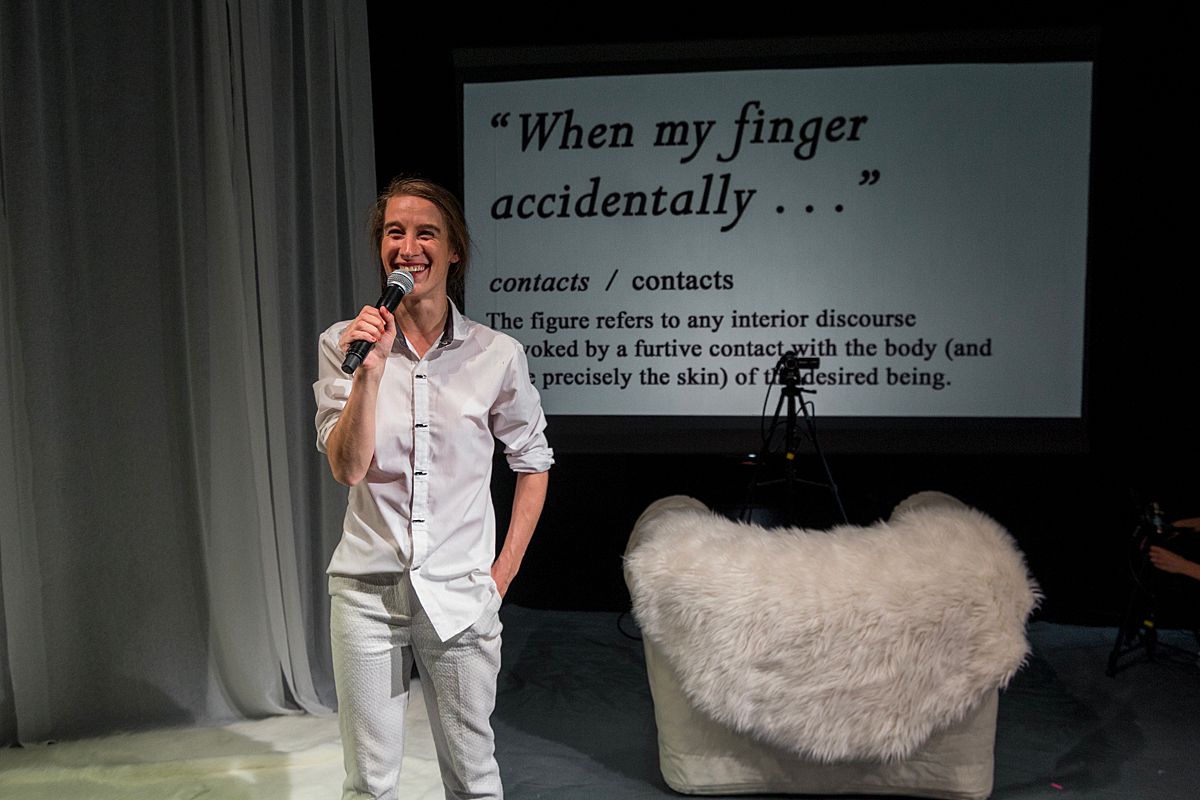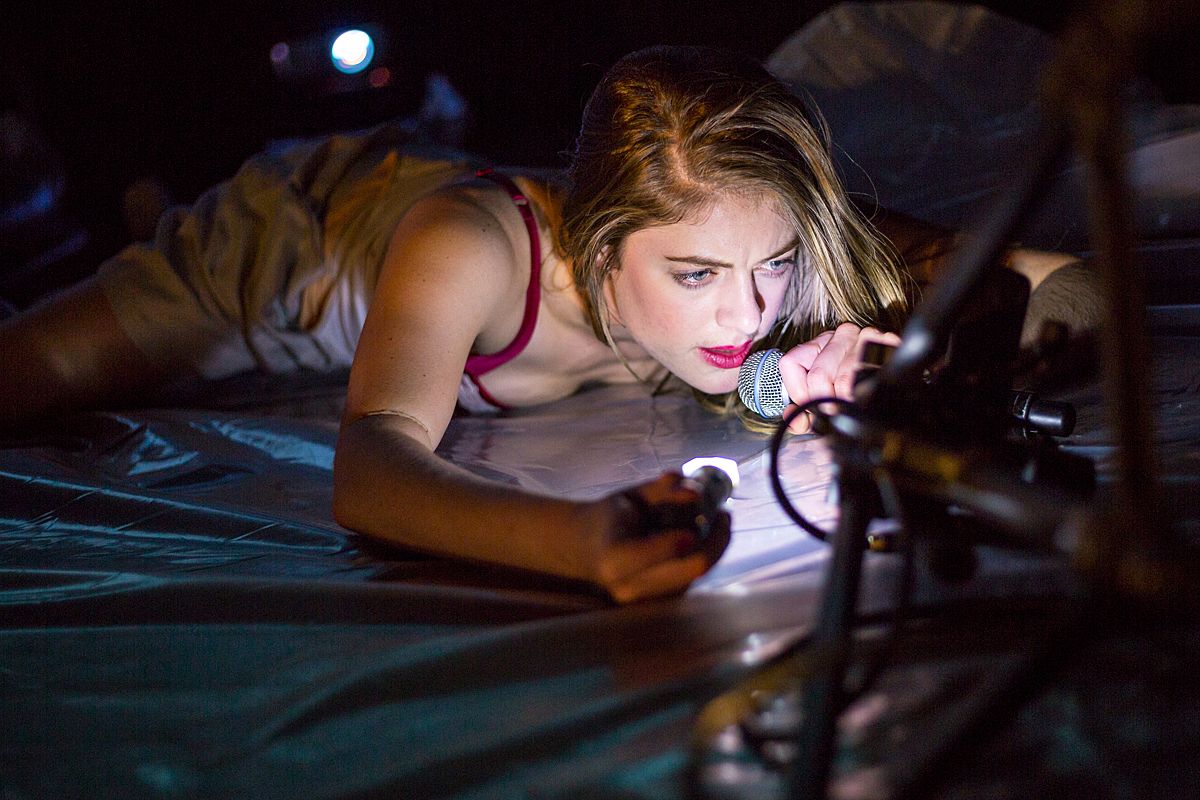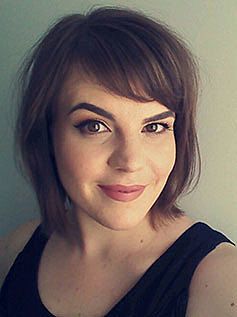One Eye On The Mirror: A Review of Body Double
Hannah Banks reviews BATS Theatre's STAB production for 2017, Body Double, a fierce, exciting whirlwind of personal stories and semiotic discourse around sex and sexuality that doesn't always pull you in.
Hannah Banks reviews BATS Theatre's STAB production for 2017, Body Double, a whirlwind of personal stories and semiotic discourse around sex and sexuality that doesn't always pull you in.
“I want all of the power, and I want none of the power.” Body Double sets up constant oppositions, inviting us into a paradox and asking us to question everything, but this contradiction is the complex axis that Body Double spins on. This feeling of wanting everything and nothing. This line is the heart of it.
Created by director Eleanor Bishop and performers Julia Croft and Karin McCracken for BATS Theatre’s 2017 STAB production, an annual commission (supported by Creative New Zealand) for artists to realise something ambitious, experimental or unusual, Body Double explores the complexities and multiplicities of female desire and sex. Julia and Karin enact memories and fantasies and tear down the way female desire is portrayed in the media. There is a lot to love about this, watching these two women express themselves on stage with such honesty while still being caring and empathetic. They’re clever and intellectual and funny. They light a fire of confidence inside me.
Feminist theatre like this is essential today, digging into thorny issues and forcing people to talk about them more. Too often we shy away from talking about sex and desire. But it is hugely important to talk about why sex should be good, especially for young women. I think this conversation should be shouted from the rooftop of BATS; screamed into the wind. While Body Double doesn’t re-write the script on the presentation of female desire as such, it does deconstruct it. It shows us the script, gives us the eyes to see that this “female desire” is so often a performance. This deconstruction and exposure is achieved partly through a brilliant use of feminist dramaturgy. Body Double rejects conventional narrative structure; instead, Bishop, Croft and McCracken slowly build a series of episodes, the mechanics all laid bare. Their academic introduction where they cite their sources, the knowing wink that this show will get “a bit experimental,” and the constant direct address, all create a very self-aware performance. They build regular breaks into their fourth wall where Karin and Julia check in with each other and the audience to see how everyone is going. These check-in moments feel like coming up for air, and give the whole piece the quality of breathing, emerging and then receding.
Bishop, Croft and McCracken have built and use a feminist structure that mirrors what American director and writer Deborah Randell calls “a swirling spiral of contraction and release.” Also in their feminist dramaturgical tool kit is the use of a female gaze, defined by Jill Soloway, the writer and director of the TV show Transparent, as “…storytelling to get you on somebody’s side… It is a wresting away of the point of view, of changing the way the world feels for women when they move their bodies through the world… feeling themselves as the subject.” Body Double fully embraces the female gaze: and the moments that work, for me, are the moments when this is fully achieved. When they reclaim the body and use it to communicate a feeling of being in feeling. Rather than having the audience just looking at them, Karin and Julia encourage us to feel with them; emotions are prioritised over actions.
One section nails this complexity: a montage of orgasming women from Hollywood films is projected on an upstage screen and a live feed of Karin is projected over the top as she tries to mimic them and get into the same ridiculous positions. This sequence is entertaining, it also communicates the feeling of trying so hard to be the object but failing because it’s impossible; Karin is left completely deflated. Body Double takes this idea a step further, Karin and Julia discussing how at times they are the object and the subject simultaneously. They grapple with the contradiction of sometimes wanting to be both: stories of dancing alone in the kitchen while cooking, dancing for yourself but still watching yourself in the mirror as you flip your hair. That line from 'You’re So Vain' – You had one eye on the mirror / And watched yourself gavotte – becomes a refrain for the show. It’s complicated, and Body Double acknowledges that feeling without making us feel bad about it.
There is a lot to love about this, watching these two women express themselves on stage with such honesty while still being caring and empathetic. They’re clever and intellectual and funny. They light a fire of confidence inside me.
Body Double is like a live music video. It’s an overwhelming and wonderfully indulgent sensory experience, and the spectacular design pulls us into the female gaze and illustrates the inherent conflict between subject and object. The detailed media design by Kevin Ramser layers projections on different surfaces, Karin’s shoulder in close up on one, a raw chicken being massaged on the other, the combination creating rich new meanings. The lavish set and costumes by Lucy Pope, crisp lighting by Marcus McShane, and triumphant sound by Te Aihe Butler interwoven with kickass classic pop songs (like 'Atomic' by Blondie), all create a lush world full of texture. Live cameras focus, close and tight, on Julia and Karin being in feeling, being the subject of their feeling, in contrast to outdated excerpts from Anna Karenina, or a cliched clip from some romantic comedy. In one moment, Julia and Karin execute a deadpan re-enactment, and detailed take-down, of the rainy sex scene from The Notebook, layering together the actual film clip, a frank inner monologue-cum-commentary, and the dispassionate disrobing of a blow-up doll. These moments effectively highlight the ridiculous expectations placed on female desire, and the upfront honesty here was so refreshing.
But for all its positives and righteous messages, Body Double isn’t without faults. In an interview in Sunday magazine, director Eleanor Bishop said “This is our little attempt to speak really for ourselves. And that's a really contentious area in feminism, I think, there's a constant pressure to represent everyone and I'm just really fed-up with that.” I understand and appreciate the pressure that Eleanor describes, and I so support them wanting to speak for themselves. However, this does mean that the conversation has its limits, necessarily so: it becomes a heteronormative one, two cis white women speaking about their desires. They absolutely should be able to discuss their own experiences – women’s voices are so often silenced and we need to be able to tell our own stories – but it’s important to acknowledge that this discussion is coming from a place of relative privilege and it’s important that this privilege is mediated so that other potential perspectives, bodies and desires aren’t left out. The messages of Body Double are intimate and personal, but they still need to have a wide reach. In order to create change, everyone needs to be a part of the conversation. Perhaps because of the makers’ focus on themselves, the potential universality of those messages is lost.
The sections that work for me in Body Double are the moments that I recognise and relate to. Julia describing the imaginative journey of just looking at someone and playing out your whole fantasy relationship in your head; the brutal acknowledgement that that sex move just isn’t working for you, while still wanting to be encouraging; Karin describing herself dancing, being her own subject and object. The moments where they came up for air and talked frankly about their own friendship on that stage: I lived for those moments. Those are the moments when I really believe their battle cry that, “It’s not about [him]!” I know that it is impossible for any work of art to be for and to speak to everyone, but there must be a way for this theatre, theatre about sex and desire, to be more inclusive. It’s too important not to try to reach and connect with a large and diverse audience.
The final 15 minutes of Body Double, as Julia wonderfully yells, is full of “open cunted screams.” The desperation is palpable: they just want to be listened to. Both performers lay out their contradictions, their Roxane Gay style “bad feminist” moments. They set up difficult questions that this show isn’t going to answer. I leave the theatre unsure. I don’t know how I feel. I don’t know what to do with this. There was so much that I enjoyed and that I related to. But I think that theatre about desire should make us feel, connect us with something primal and raw. While Body Double is clever, funny, with incredible design and evocative performances, it struggles to make me feel. It’s a paradox: for all its emphasis on desire, it remains quite distant and intellectualised.
We put so much unwarranted pressure on feminist work: it has to be perfect, it must speak for everyone, the politics must not be reductive. This pressure is unfair, and sets everyone up to fail in some way. Body Double is by no means perfect. It definitely doesn’t speak for everyone. It is an important conversation, a conversation about sex that should be had loudly, explicitly and honestly. It doesn’t rewrite or reinvent the presentation of female desire, but it does allow us to see beyond the fakery. It reemphasises that “female desire,” sex, gender, it’s all a performance, a performance that is informed and facilitated by media, porn, past relationships, Hollywood and Russian novels. It exposes the mechanisms of this performance and shows us that we don’t have to play along anymore. There’s a feeling of freedom in this realisation.
Maybe that’s enough. Maybe it doesn’t have to answer all of the questions it proposes. Maybe all it has to do is help you feel free.
Body Double runs from 9 to 25 November at BATS Theatre. Tickets available here.
Body Double will also run from 20 to 29 March at Q Theatre Loft as part of the Auckland Arts Festival. Tickets available here.



